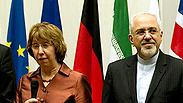
'If we wait until after the agreement with Iran is signed, it will be too late'
צילום: AP
Take initiative to avoid isolation
Op-ed: Israel must make a strategic move which will restore its relations with US and Western countries, so it can influence agreement taking shape with Iran
The preliminary agreement between Iran and the world powers, which took effect on January 20, is a significant and concerning move. The Iranians will be able to pursue a limited nuclear program in the next six months, until July 2014, and in return the West will gradually remove some of the sanctions imposed on them.
During this period, the talks between the powers and Iran will continue in order to reach a final agreement, and in return the economic sanctions will be completely lifted.
The agreement signed with Iran leaves it with the uranium enrichment abilities, although it is required to diminish them. The nuclear program may be restricted, but Iran will be able to fool the inspectors and reach a situation of a threshold state relatively easily – and even beyond that.
In addition, the Iranians seek to reach higher enrichment levels for different needs such as nuclear-powered submarines (according to them). The issue will likely be put on the agenda in the talks on the permanent agreement, and it is quite possible that it will be approved.
Israel has been dealing with the Iranian threat for many years. It was discussed for years in utmost discretion, and Israel adopted a policy of secret diplomacy, tight coordination with the United States and quiet operational activity. In the past five years, under the leadership of Benjamin Netanyahu as prime minister, Israel changed its policy and waged an open diplomatic battle against Iran and an oppositional battle against Obama's United States, while explicitly threatening to launch a military operation.
Some will argue that Israel's policy led to the tightening of the sanctions. There may be a grain of truth in that, but the final outcome is an agreement taking shape between Iran and the West, which may lead to Iran holding a nuclear weapon – on the background of a very problematic relationship between the US and Israel, which is reflected in distrust between the Obama administration and the Netanyahu government and does not enable Israel to influence the agreements being devised between Iran and the powers. The peace talks with the Palestinians are now the only bridge allowing a dialogue between Israel and the West, and mainly between Israel and the US.
This is not the time to examine and investigate which policy was more correct. Clearly, Israel has been caught in a complex situation in which it is likely to be isolated, without any influence or an ability to coordinate with its greatest friend. Israel must quickly make a strategic move which will restore its relations with the US and Western countries, so that it can influence the talks and the agreement being devised with the Iranians and improve its international status. This can be done through a surprising diplomatic move which will improve Israel's status in the world, take the initiative out of the Iranian's hands and boost the strategic coordination and intimate relations with the US.
Israel is still a strong and deterring country, and it must work to maintain this situation. It's time to initiate and take risks. If we wait until after the agreement with Iran is signed, it will be too late. Israel will remain isolated and weak.
Vice Admiral Eliezer Marom was the commander of the Israeli Navy in the years 2007-2011










